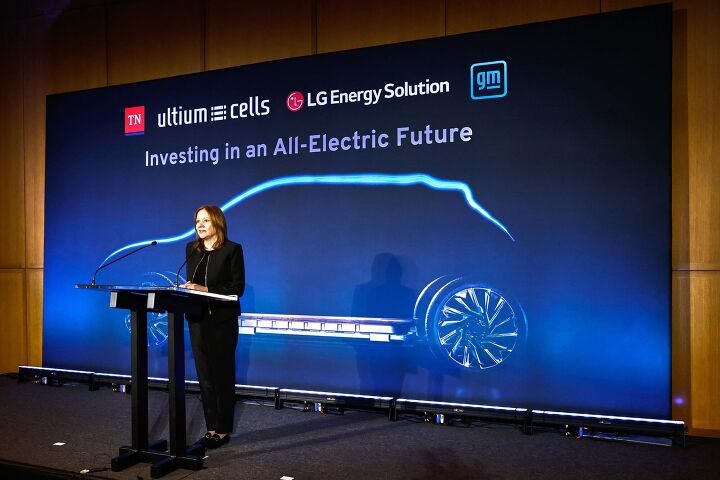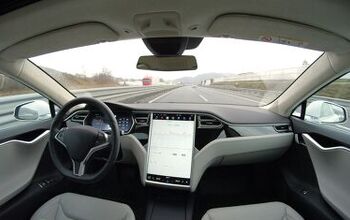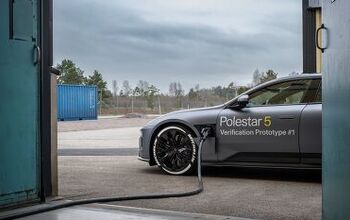U.S. Preps $2.5 Billion for GM Electric Vehicle Battery Venture With LG

With the United States having successfully passed the Inflation Reduction Act over the summer, the financial floodgates have been opened for battery suppliers. Despite often being framed as a massive infrastructure package that would also help tamp down U.S. inflation, the bill also included numerous items from the Biden administration’s climate agenda setting aside billions for industries vowing to go green. This includes the joint venture between General Motors and LG Energy Solution – which will receive $2.5 billion in loans to build three new lithium-ion battery factories.
The cash comes from the Advanced Technology Vehicles Manufacturing (ATVM) loan program and offers favorable terms for Ultium Cells LLC and will help finance the construction of manufacturing plants in Ohio, Michigan, and Tennessee.
According to Reuters, U.S. Energy Secretary Jennifer Granholm will be spending most of Monday proclaiming the loans as a victory in Michigan while meeting with Labor Department Deputy Secretary Julie Su, Michigan Governor Gretchen Whitmer, United Auto Workers (UAW) President Ray Curry, and other officials, automakers and EV battery companies. The group will also reportedly “discuss strategies to recruit and retain a diverse and skilled battery workforce, and the Biden administration's Battery Workforce Initiative.”
The government would like to increase battery production stateside due to how much of the industry is localized to Central Asia. However, due to the Biden administration wanting 50 percent of all U.S. auto production to be electric or plug-in electric hybrid vehicles by 2030 (with gas and diesel cars to be phased out by 2035), leadership believes it can incentivize the industry into building within the U.S. by waving enough cash under the right noses.
But there’s also a stick to accompany the government’s financial carrot. With the EV tax credit system having been rejiggered under the so-called Inflation Reduction Act of 2022, funding is now tied to the domestic content of the EVs battery pack. This encompasses both the materials going into the unit as well as where final assembly takes place and the necessary percentage escalates each year. This means automakers vying to sell EVs in the United States will need to bring manufacturing there in order for their vehicles to qualify for credits of up to $7,500.
Considering the number of domestic partnerships we’ve seen formed between automakers and companies like SK Innovation and LG recently, it seems as though the plan is working. Though a lot of those deals were completed a year before the Inflation Reduction Act was passed, making it hard to know how much credit to give the plan unless your job is to cheerlead for it.
“It is flooring the accelerator to build the electric vehicle supply chain here at home – and that starts with domestic battery manufacturing led by American workers and the unions that support them,” stated Granholm. “This loan will jumpstart the domestic battery cell production needed to reduce our reliance on other countries to meet increased demand and support President Biden’s goals of widespread EV adoption and cutting carbon pollution produced by gas-powered vehicles.”
GM and LG Energy are reportedly considering a fourth U.S. battery plant for Indiana. Though, even without it, the three-plant deal is supposed to yield roughly 6,000 temporary construction jobs and another 5,100 factory positions. As of Monday, Ultium Cells LLC said that the $2.6-billion dollar facility in Michigan should open in 2024 – adding investments for the $2.3-billion battery facility in Tennessee would be increased by an additional $275 million.
If you’re a fierce advocate for electric vehicles, then you’re probably already dancing in the streets. However, those skeptical of any state-backed push for electrification or unfettered government spending are likely to be far less enthusiastic.
[Image: General Motors]
Become a TTAC insider. Get the latest news, features, TTAC takes, and everything else that gets to the truth about cars first by subscribing to our newsletter.

A staunch consumer advocate tracking industry trends and regulation. Before joining TTAC, Matt spent a decade working for marketing and research firms based in NYC. Clients included several of the world’s largest automakers, global tire brands, and aftermarket part suppliers. Dissatisfied with the corporate world and resentful of having to wear suits everyday, he pivoted to writing about cars. Since then, that man has become an ardent supporter of the right-to-repair movement, been interviewed on the auto industry by national radio broadcasts, driven more rental cars than anyone ever should, participated in amateur rallying events, and received the requisite minimum training as sanctioned by the SCCA. Handy with a wrench, Matt grew up surrounded by Detroit auto workers and managed to get a pizza delivery job before he was legally eligible. He later found himself driving box trucks through Manhattan, guaranteeing future sympathy for actual truckers. He continues to conduct research pertaining to the automotive sector as an independent contractor and has since moved back to his native Michigan, closer to where the cars are born. A contrarian, Matt claims to prefer understeer — stating that front and all-wheel drive vehicles cater best to his driving style.
More by Matt Posky
Latest Car Reviews
Read moreLatest Product Reviews
Read moreRecent Comments
- Corey Lewis It's not competitive against others in the class, as my review discussed. https://www.thetruthaboutcars.com/cars/chevrolet/rental-review-the-2023-chevrolet-malibu-last-domestic-midsize-standing-44502760
- Turbo Is Black Magic My wife had one of these back in 06, did a ton of work to it… supercharger, full exhaust, full suspension.. it was a blast to drive even though it was still hilariously slow. Great for drive in nights, open the hatch fold the seats flat and just relax.Also this thing is a great example of how far we have come in crash safety even since just 2005… go look at these old crash tests now and I cringe at what a modern electric tank would do to this thing.
- MaintenanceCosts Whenever the topic of the xB comes up…Me: "The style is fun. The combination of the box shape and the aggressive detailing is very JDM."Wife: "Those are ghetto."Me: "They're smaller than a Corolla outside and have the space of a RAV4 inside."Wife: "Those are ghetto."Me: "They're kind of fun to drive with a stick."Wife: "Those are ghetto."It's one of a few cars (including its fellow box, the Ford Flex) on which we will just never see eye to eye.
- Oberkanone The alternative is a more expensive SUV. Yes, it will be missed.
- Ajla I did like this one.


































Comments
Join the conversation
"Don't want to run my home appliances on gasoline or diesel because of carbon monoxide."
Who has *EVER* advocated for that?
EBFlex--You lack any character except that of a jest.